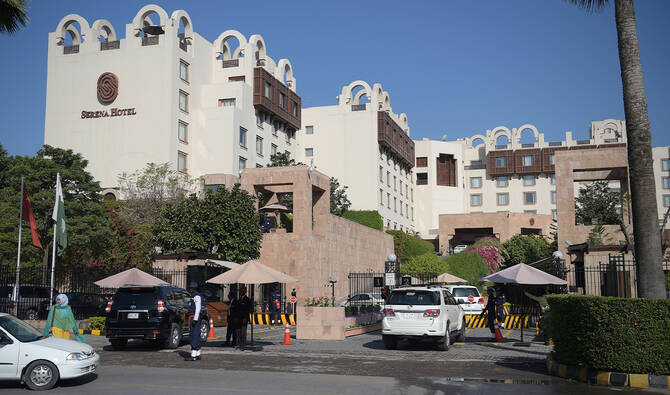ISLAMABAD: Jailed former prime minister Imran Khan has denied reports a deal has been made for his release from prison, once again inviting the “establishment” for talks in the interest of Pakistan as it faces external and internal security threats and treads a tricky path to economic recovery.
In Pakistan, the establishment is a euphemism to describe the armed forces and intelligence agencies and associated pro-military entities.
The military has ruled Pakistan for at least three decades since independence in 1947 and wields extraordinary influence even with a civilian government in office. The current army chief, General Syed Asim Munir, promoted this week to field marshal, only the second general in Pakistan to get the rank, is widely believed to have considerable sway over government affairs. The military says it does not interfere in politics.
“The rumors that are being spread about a deal with me, no deal has been made, nor are there any talks regarding a deal, are all lies,” Khan said in a message posted on his X account after he met his lawyers and family members on Wednesday.
“I myself am inviting the establishment that if they want to talk in the interest of Pakistan, if they are concerned about Pakistan, then come and talk,” he added, saying political forces in the country would have to come together at a time when Pakistan faced “external threats, growing terrorism, and the restoration of the economy.”
“I was not asking for anything for myself before, nor will I ask for anything now,” Khan said, referring to reports he was trying to negotiate a deal to get out of prison.
After being jailed in August 2023 and slapped with a slew of cases Khan says are politically motivated, a Pakistani court sentenced him to 14 years imprisonment in a land corruption case in January. Before that, he had either been acquitted or his sentences suspended in most other cases, except for one on charges of inciting supporters to rampage through military facilities to protest against his arrest on May 9, 2023. Khan denies giving the instructions for the protests.
His supporters have led several violent protest rallies since the May 9 incidents, with the government and military publicly vowing to bring the perpetrators to justice. The protests were widely seen as the most serious challenge to the military’s hegemony in years.
The army has since also faced sharp domestic criticism over accusations it was behind the jailing of Khan and cracking down on supporters of his Pakistan Tehreek-e-Insaf party, as well as what critics alleged was rigging the general election last year to favor a rival party. The army rejects the accusations.
But the military’s popular support has surged after the worst military conflict in decades with arch-rival India earlier this month. On May 7, the Indian military carried out air strikes on what it called “terrorist infrastructure” in Pakistan, in response to a militant attack in Indian-administered Kashmir.
Pakistan claimed to have downed at least 5-6 Indian fighter jets in response and carried out air strikes on Indian military bases. India has indicated that it suffered some losses and inflicted damage on key Pakistani air bases and air defense systems.
A ceasefire was brokered by the US on May 10.
– With inputs from Reuters




















